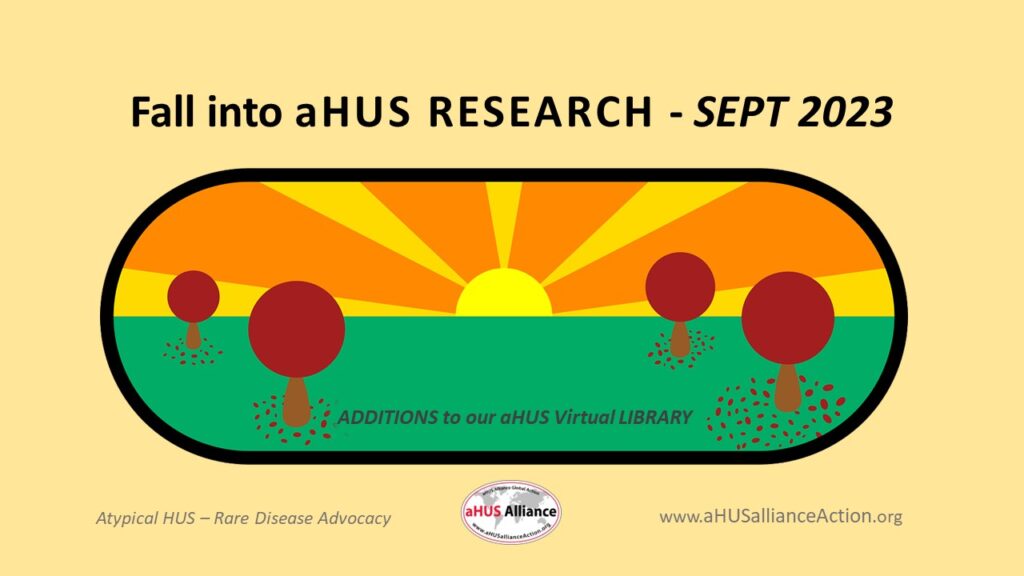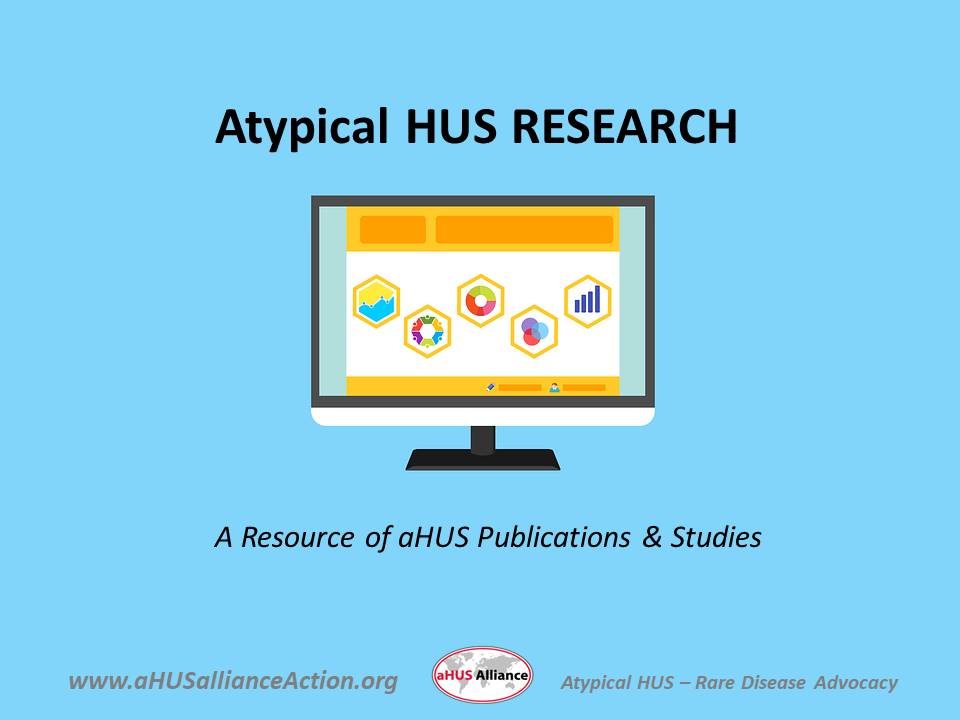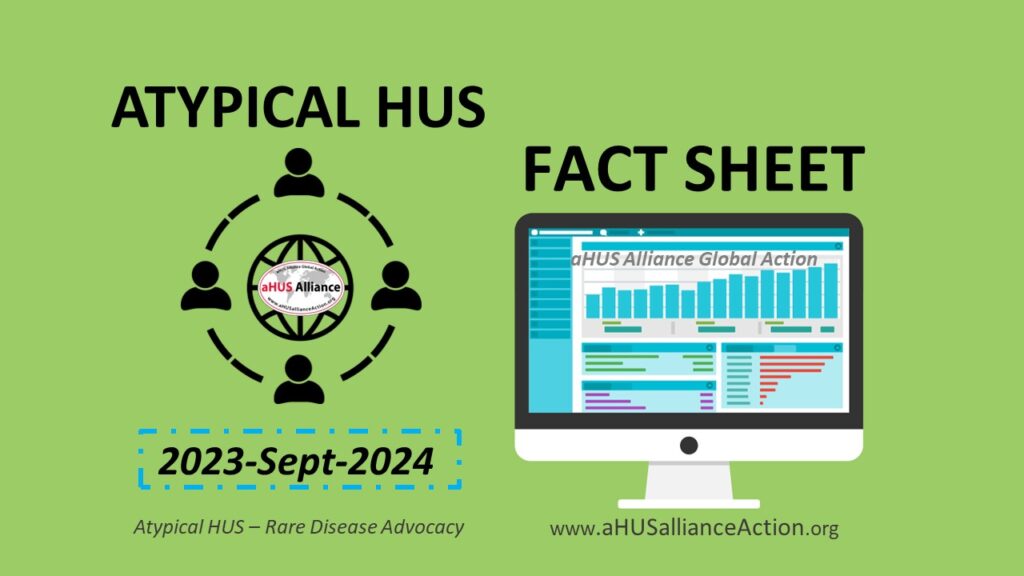
As the third quarter of 2023 arrives, and to mark our 9th annual aHUS Awareness Day campaign on 24 September, we’re announcing a helpful new feature for our ‘virtual library’ of aHUS-specific publications and research. Nearing an aHUS-specific list of almost 1,300 unique articles, readers’ conveniently can now click on one of 20 categories noted at the pages’ top to speedily key in on a specific interest and jump to scrolling lists for ‘New Research’, ‘Pregnancy’, ‘Transplants’, or other topics.
We marked aHUS Awareness Day for 24 Sept 2021 with our own advocacy-based research, releasing the 1st of 4 reports of data and insights from aHUS Alliance Global Action team on the 2021 global survey of aHUS patients’ experiences about the diagnostic process (see https://bit.ly/2021aHUSPollData). This year’s theme for our 2023 awareness campaign was Capabilities and Possibilities, and several recent publications fit well within that scope.
While we regularly add new research to our page, it’s meaningful that our 9th annual 24 September campaign finds two recent publications which featured concerns voiced by aHUS patients and family caregivers, central to the very concept of aHUS Awareness Day. (Among the list of co-authors, one publication included an aHUS global advocate and family caregiver: LB) We applaud those clinicians, researchers and other stakeholders who actively engage and incorporate the voice of aHUS families and activists.
aHUS Care: Need for a Multidisciplinary Approach
While years earlier atypical HUS was primarily considered a kidney disease, it’s been several years since medical literature has continued to report involvement of other organs as well. Journal articles now have well doumented these ‘extra renal manifestations’, or damage to organs such as the heart, lungs, eyes, GI tract and elsewhere.
What continues to be perplexing is that, even with COVID-19 articles stressing potential for ‘whole body’ damage from thrombotic microangiopathy (TMA), more hospitals have yet to establish teams across multiple medical specialties to oversee diagnosis and treatment. We appreciate the leadership of Dr Rupesh Raina (Dept of Nephrology: Akron Children’s Hospital, and Cleveland Clinic Foundation) to integrate aHUS patient needs and views across articles (eg Raina et al, 2019), as well as fostering welcoming relations with other experts in the field.
Yerigeri K, Kadatane S, Mongan K, Boyer O, Burke LLG, Sethi SK, Licht C, Raina R. Atypical Hemolytic-Uremic Syndrome: Genetic Basis, Clinical Manifestations, and a Multidisciplinary Approach to Management. J Multidiscip Healthc. 2023 Aug 4;16:2233-2249. doi: 10.2147/JMDH.S245620. PMID: 37560408; PMCID: PMC10408684.
aHUS Treatment: Patient Preference and Quality of Life
Patients living with any medical condition naturally wish for treatment that is safe, effective, available, and affordable. Atypical HUS affects every area of life for patients and their families. In late July a team of aHUS clinician-researchers reported their findings regarding ‘Quality of Life’ (QoL) measures and treatment impact in relation to preferences of USA patients and caregivers.
Mauch TJ, Chladek MR, Cataland S, Chaturvedi S, Dixon BP, Garlo K, Gasteyger C, Java A, Leguizamo J, Lloyd-Price L, Pham TP, Symonds T, Tomazos I, Wang Y. Treatment preference and quality of life impact: ravulizumab vs eculizumab for atypical hemolytic uremic syndrome. J Comp Eff Res. 2023 Sep;12(9):e230036. doi: 10.57264/cer-2023-0036. Epub 2023 Jul 29. PMID: 37515502.
Among other recent publications regarding aHUS treatment are:
Chen JY, Cortes C, Ferreira VP. Properdin: A multifaceted molecule involved in inflammation and diseases. Mol Immunol. 2018 Oct;102:58-72. doi: 10.1016/j.molimm.2018.05.018. Epub 2018 Jun 27. PMID: 29954621; PMCID: PMC7375857.
Java A, Kim AHJ. The Role of Complement in Autoimmune Disease-Associated Thrombotic Microangiopathy and the Potential for Therapeutics. J Rheumatol. 2023 Jun;50(6):730-740. doi: 10.3899/jrheum.220752. Epub 2023 Jan 15. PMID: 36642429.
Zipfel PF, Zipfel S, Wiech T. Die Rolle des Komplementsystems bei Nierenerkrankungen – Neue Aspekte [Role of Complement in Kidney Diseases – New Aspects]. Dtsch Med Wochenschr. 2023 Jun;148(12):774-779. German. doi: 10.1055/a-1936-6697. Epub 2023 May 31. PMID: 37257480.
Drug Research & Discovery
As we look back on the early days of aHUS research, such as our recent article about Dr Paul Warwicker (UK), we better appreciate the groundwork of investigators who laid a valuable framework for current research. Central to that would be utilizing knowledge to optimize treatment and discovery of new aHUS therapeutic drugs. We’ve added several more recent publications to our scroll “Drug Discovery/Research”, including the two highlighted below. In one an international team of experts published an article on clinical trial design for the investigational drug iptacopan (Novartis: oral administration). The other publication noted below is about the biosimilar, SB12 from Samsung Bioepis. (Read our Aug 2023 article on Biosimilars, ‘a Different type of aHUS Drug’)
Kavanagh D, Greenbaum LA, Bagga A, Karki RG, Chen CW, Vasudevan S, Charney A, Dahlke M, Fakhouri F. Design and Rationale of the APPELHUS Phase 3 Open-Label Study of Factor B Inhibitor Iptacopan for Atypical Hemolytic Uremic Syndrome. Kidney Int Rep. 2023 Apr 29;8(7):1332-1341. doi: 10.1016/j.ekir.2023.04.029. PMID: 37441479; PMCID: PMC10334406.
Kim H, Hong E, Lee J, Hong S, Kim J, Cho M, Kim Y, Yoo T. Characterization for the Similarity Assessment between Proposed Biosimilar SB12 and Eculizumab Reference Product Using a State-of-the-Art Analytical Method. BioDrugs. 2023 Jul;37(4):569-581. doi: 10.1007/s40259-023-00591-9. Epub 2023 Apr 15. PMID: 37060541; PMCID: PMC10287819.
Our previous comprehensive review about potential new aHUS therapeutic drugs contained a chart with active links to clinical trials, with an overview of pipeline aspects.Our website’s Clinical Trial Watch series has continued to detail new developments, which are also highlighted on our aHUS social media. A current search of ClinicalTrials.gov with parameters for ‘Atypical Hemolytic Uremic Syndrome, Thrombotic Microangiopathy’ yields 38 results however not all are active, recruiting studies.
Staying Current with aHUS Research
The most active publication category recently swelled our ‘Genetics’ scroll, with over a dozen publications newly released in less than the past 6 months. Clinical trial news and research publications are difficult to track due to lack of standard terminology and nomenclature. People will find information and advancements in the atypical HUS under a variety of key words and classification variants, which makes for a fragmented information flow.
Our aHUS Alliance Global Action team offers information important to those living with (or treating patients with) atypical HUS, whether it’s tagged under “complement mediated disease” or regarding developments for conditions with similar treatment needs (PNH, or COVID-19’s thrombotic microangiopathy). Our website underscores such relationships with articles such Long aHUS and Micro-clots in COVID and aHUS. As knowledge deepens and more connections are made, we will continue sharing information and building meaningful opportunities for collaboration in the aHUS space.

Want to know more about recent aHUS research? To view the above and more new aHUS-specific articles, click on their titles within our ‘New Research’ scroll. Looking for more information on a particular topic, such as how atypical HUS impacts organs throughout the body? Use the category Jump links at the top of the page, and quickly skip to topics such as pregnancy, transplant, and others to see links to titles released over the year.
Please Note: While our ‘aHUS virtual library’ contains over 1,300 publications from over almost 2 decades, it will reflect many but not all articles published on atypical HUS topics.
Research & Publications page
https://bit.ly/aHUSvirtualResearchLibrary

2023 – SEPT – 2024: aHUS FACT SHEET
Link to Print & Share

